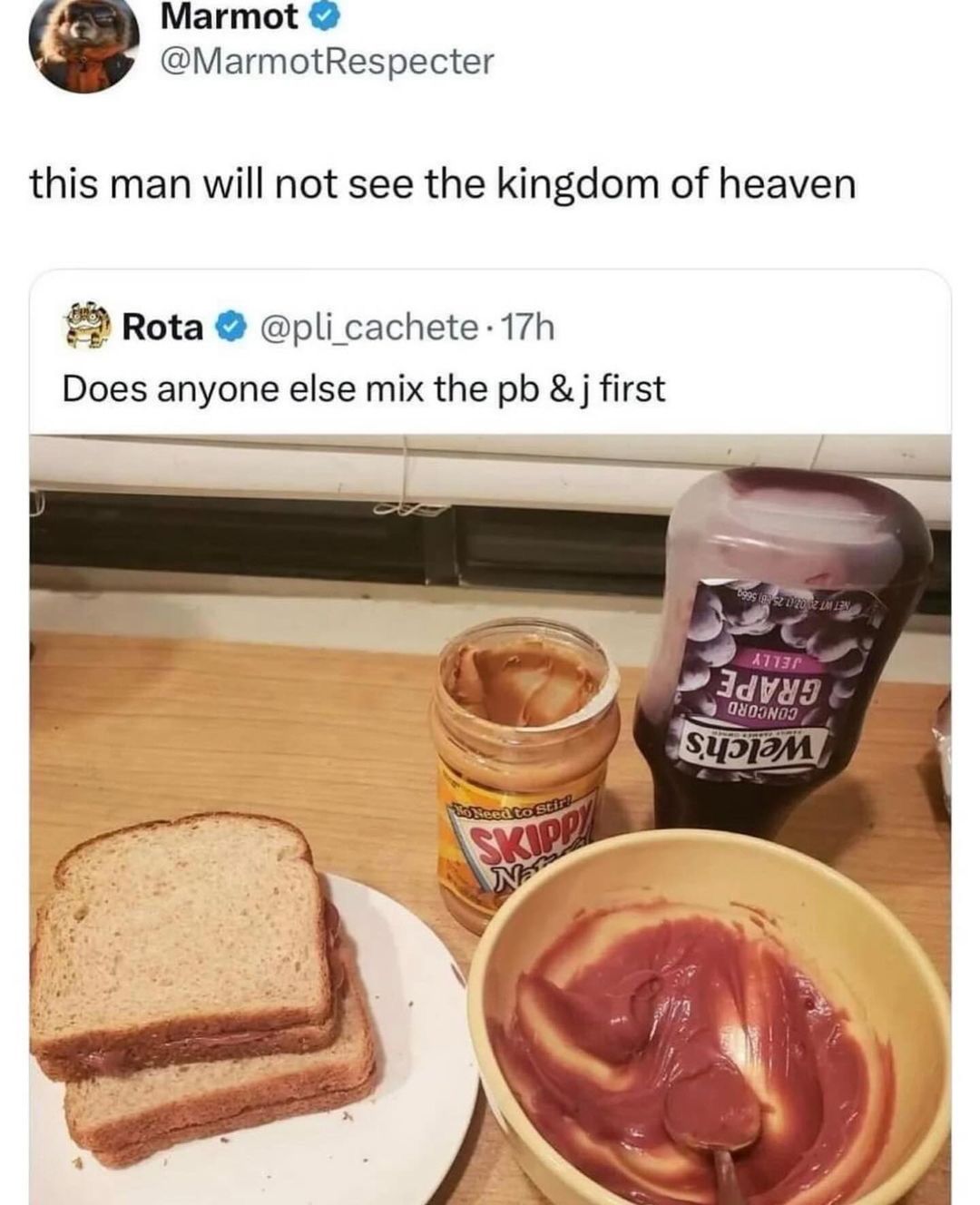this post was submitted on 18 May 2024
220 points (93.3% liked)
People Twitter
5230 readers
508 users here now
People tweeting stuff. We allow tweets from anyone.
RULES:
- Mark NSFW content.
- No doxxing people.
- Must be a tweet or similar
- No bullying or international politcs
- Be excellent to each other.
founded 1 year ago
MODERATORS
you are viewing a single comment's thread
view the rest of the comments
view the rest of the comments

Out of curiosity, are you British/European?
In the UK at least (and by extension other European countries which tend to prefer UK nomenclature when using English) jelly has a different connotation than it does in the US.
British jelly is gelatin, set in a mold. In the US, that dish is more commonly known as Jell-O, a name brand of gelatin that has entered common use.
American jelly is what the British would call seedless jam, a fruit spread made like jam but with the more solid parts of the fruit like seeds filtered out until it is a single consistency. It traditionally comes in jars, but its viscosity makes it easy to put in a squeeze bottle like ketchup.
Canadian.
Only thing I've ever put on a PB&J is fruit preserves from a glass jar. The kind that is a heterogeneous suspension of small fruit chunks in a medium. I would use the terms jelly and jam completely interchangeably talking about that stuff.
Never heard of or seen "seedless jam" like that in the OP image before.
Jell-O and jelly are completely different in my mind. Jell-O is Jell-O, jelly is the thing I described above.
We seem to have stumbled onto a very strange cultural/linguistic oddity. I legitimately never considered that Americans put this "seedless jam" stuff on their sandwiches. I always assumed American PB&J was identical to Canadian.
You’re a Canadian and you’ve never seen Welch’s grape jelly, or jelly in general?
I've seen Welch's gummies before... Never jelly in a squeeze bottle like that though. The jam aisle at most grocery stores I've gone to is pretty much just Smuckers and similar jarred jams
Interesting. We have jars of smucker's jellies here in America too, but it's the homogenous seedless kind as described above, same stuff that's in the squeeze bottle. We don't really call it "seedless preserves" here though, that's just implied with jelly. I might call the heterogeneous kind you described "jam" or "preserves" instead of jelly, but that distinction might be a local thing.
i too, grew up calling it "jam"... preserves were actually the extra heterogeneous variety, usually homemade... and jelly was the congealed, grape flavored, high fructose corn syrup...
and then there's apple butter... which is just made out of apples...
From what I know, jam is what you described as the heterogenous fruit preserve. It'a basically fruits roughly choped, sugar and pectine.
Jelly is kinda the same thing, but instead of using whole fruits, you use juice (with sugar and pectine).
Jell-o is generally artificially flavored gelatine (which comes from animal bones).
If I'm not mistaken, in Canada there are laws specifying what can be labeled as jam and jelly, like sugar concentration and stuff like that.
In the US jelly, jam, and preserves are all close to the same thing (fruit spread that you put on sandwiches)
It's a little weird, here's an article that would describe the process of making some if you're curious:
https://www.masterclass.com/articles/how-to-make-easy-homemade-jelly-basic-jelly
I prefer jam in general, but a lot of people find this stuff easier to spread on a pb&j sandwich (like softer untoasted bread) or other uses where a thick texture would make jam more difficult to use but they still want the fruit goo (like filling a pastry with maybe). Usually we would use the word jam to mean like a chunkier fruit preserve, and jelly specifically refers to this stuff.
American Jelly, in regards to Peanut Butter and Jelly, is often made from fruit juice of usually concord grapes.